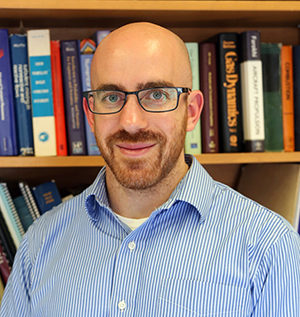 |
| Prof. Adam Steinberg |
Daniel Guggenheim School of Aerospace Engineering professor Adam Steinberg is a part of a team of academic and industry experts recently recognized by the AIAA Propellants and Combustion Committee for their contributions to "Influence of Cross-Frequency Interactions on Nonstationary Thermoacoustic Oscillations in a Rich-Burn Gas Turbine Combustor at Elevated Pressure.”
The paper was chosen to receive the 2019 AIAA Propellants and Combustion Best Paper Award, a distinction that will be formally conveyed during AIAA's Excellence in Aerospace Recognition Luncheon to be held August 26 in New Orleans. Joining Steinberg in this recognition will be the lead author, Mitchell L. Passarelli - one of Steinberg's doctoral students - and Dr. Tim Wabel, a former post-doc of Steinberg's who now works at the Aerospace Corporation. The other two authors are General Electric employees, Dr. Krishna Venkatesan, and Arin Cross.
The paper explores the team's experiments using simultaneous high-speed optical diagnostics to study the complicated ways in which combustion, fluid mechanics, and the fuel system can couple together to drive instabilities in gas turbine combustors. Ultimately, their work showed how different processes at different frequencies can contribute to the organization of pressure fluctuations into intermittent bursts of coherent, nearly unimodal oscillations.
Explains Steinberg:
"Thermoacoustic instabilities remain one of the biggest challenges to reducing pollutant emissions from jet engines. While we have learned a lot about these instabilities from fundamental studies, our new experiments at real engine conditions, with real hardware and fuels, are revealing interesting new interactions that have not previously been seen. Results like these help change how we design combustors to be both stable and sustainable."
In addition to being published in the November 2020 edition of Aerospace America magazine, the paper will be published in perpetuity by Aerospace Research Central (ARC) and will be listed on the Propulsion and Energy Forum's recognition page.